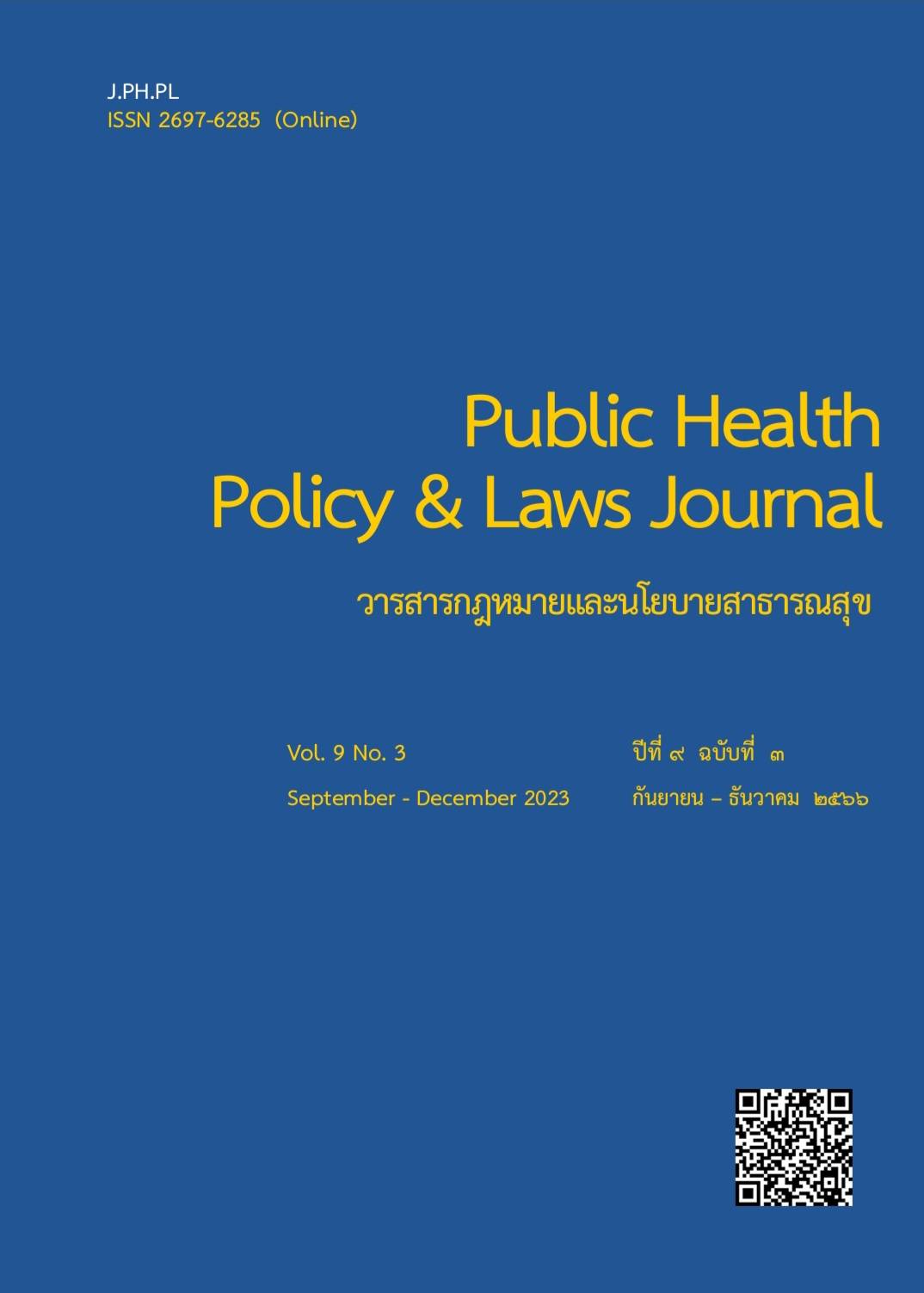จิตวิทยาเด็กที่มีผลต่อการถามปากคำผู้เสียหายและพยานเด็กในคดีอาญา
บทคัดย่อ
ในคดีอาญา หนึ่งในปัญหาอุปสรรคสำคัญในการค้นหาความจริงจากเด็ก มักเกี่ยวข้องกับการพัฒนาการรับรู้หรือเชาวน์ปัญญา และบาดแผลทางใจของเด็กและเยาวชน ซึ่งโดยปกติแล้ว เด็กส่วนใหญ่ที่มีอายุตั้งแต่ ๒-๓ ปีเป็นต้นไป จะมีความสามารถในการพูด ฟัง เข้าใจ และโต้ตอบสื่อสารกับบุคคลรอบข้างได้ ซึ่งทำให้คนทั่วไป และโดยเฉพาะอย่างยิ่ง เจ้าหน้าที่รัฐผู้มีอำนาจหน้าที่ในการสอบปากคำ พนักงานอัยการ หรือทนายความผู้มีหน้าที่ซักถามทั่วไปที่ไม่ได้รับการฝึกฝนเฉพาะทางมา มักสันนิษฐานว่า เมื่อเด็กมีความสามารถตามกฎหมายหรือความสามารถในการจดจำ การพูดหรือการกระทำเช่นเดียวกับผู้ใหญ่ การสอบปากคำเด็กและเยาวชนก็น่าจะมีขั้นตอนและกระบวนการที่คล้ายคลึงกับการสอบปากคำผู้ใหญ่ จนกระทั่งเมื่อ ๕๐-๖๐ ปีที่แล้วเท่านั้น จึงพบว่า เด็กนั้นมิได้เป็นเพียงผู้ใหญ่ตัวเล็ก ๆ ดังนี้ บทความวิชาการนี้จึงมุ่งศึกษาทางเอกสารถึงจิตวิทยาเด็ก อันได้แก่ พัฒนาการรับรู้ หรือเชาวน์ปัญญา และบาดแผลทางใจของเด็กและเยาวชน อันอาจมีผลกระทบต่อการถามปากคำผู้เสียหายและพยานเด็กในคดีอาญา เพื่อให้เจ้าหน้าที่ที่เกี่ยวข้องปรับใช้เทคนิคการถามปากคำที่มีตัวเด็กเป็นศูนย์กลาง และเลือกใช้คำถามที่เหมาะสมกับช่วงอายุและพัฒนาการของเด็ก เพื่อเพิ่มประสิทธิภาพของการค้นหาความจริงจากผู้เสียหายและพยานเด็กในคดีอาญา
คำสำคัญ: จิตวิทยาเด็ก การถามปากคำเด็ก การถามปากคำเชิงนิติวิทยาศาสตร์ ผู้เสียหายและพยานเด็ก คดีอาญา
เอกสารอ้างอิง
American Psychological Association, Trauma <https://www.apa.org/topics/trauma>
Association for Psychological Science, Children Make Better Eyewitnesses than Adults in Certain Circumstances, 22 October 2018 < https://www.psychologicalscience.org/publications/
Ceci S. J & Bruck M. (1995), Jeopardy in the Courtroom: a Scientific Analysis of Children’s Testimony, Part IV: Defining Memory and Suggestibility, 1-336.
Ceci S.J. et al (1994), The Possible Role of Source Misattributions in the Creation of False Beliefs Among Preschoolers, the International Journal of Clinical and Experimental Hypnosis, Vol. XLII, No.4, 304-320.
Ceci, S. J., Huffman, M. L. C. (1997). How suggestible are preschool children? Cognitive and social factors. Journal of the American Academy of Child & Adolescent Psychiatry, 36(7), 948-958.
Connie, T. M. (2006). Developmentally Sensitive Forensic Interviewing of Preschool Children: Some Guidelines Drawn from Basic Psychological Research, 31(2) Criminal Justice Review (2006), 132-145
Haenjohn J. (2015) Ratchaphruek Journal Vo.13 No.3 (September-December), 9-19
Hayes, B. K., Delamothe, K. (1997). Cognitive interviewing procedures and suggestibility in children’s recall. Journal of Applied Psychology, 82(4), 562-577.
Lamb M. (1995-1996). Ethical Issues in Interviewing, Counseling, and the Use Psychological Data with Child and Adolescent Clients, 64 Fordham L. Rev., 2035-2052
Larcher V. (2015) Children Are Not Small Adults: Significance of Biological and Cognitive Development in Medical Practice. In: Schramme T., Edwards S. (eds) Handbook of the Philosophy of Medicine. Springer, Dordrecht. <https://doi.org/10.1007/978-94-017-8706-2_16-1>
Levendosky, Alytia & Bogat, G Anne & Martinez Torteya, Cecilia. (2013). PTSD Symptoms in Young Children Exposed to Intimate Partner Violence. Violence against women 19(2), 187-201 < http://vaw.sagepub
.com/content/19/2/187>
LifeStance Health, The 4 Types of Trauma Responses, 3 February 2022, <https://lifestance.com/blog/four- types-trauma-response>
London, K., Bruck, M., Ceci, S. J., & Shuman, D. W. (2005). Disclosure of Child Sexual Abuse: What Does the Research Tell Us About the Ways That Children Tell? Psychology, Public Policy, and Law, 11(1), 194–226
Lyon T. D (1999) New Wave in Children’s Suggestibility Research: A Critique , 84 Cornell L. Rev. 1004, 1004- 1087 <http://scholarship.law.cornell.edu/clr/vol84/iss4/3>
Münsterberg H. (1908). On the witness stand: Essays on Psychology and Crime. New York, NY: Doubleday, 1-269.
National Children’s Advocacy Center, Guidelines for Age-Appropriate Interview Questions, 2016 < https://www.nationalcac.org/wp-content/uploads/2016/10/Questioning-Children-Graph.pdf>
National Children’s Advocacy Center, History https://www.nationalcac.org/history/
observer/obsonline/children-make-better-eyewitnesses-than-adults-in-certain-circumstances.html>
Otgaar, H., Howe, M. L., Merckelbach, H., & Muris, P. (2018). Who Is the Better Eyewitness? Sometimes Adults but at Other Times Children. Current directions in psychological science, 27(5), 378–385.
Paavola, Lilla Evelin, “The Importance of Emotional Intelligence in Early Childhood”, Bachelor’s Thesis, 2017, Laurea University of Applied Sciences, <https://www.theseus.fi/bitstream/handle/
/131619/BA%20Thesis%20of%20Lilla%20Paavola.pdf?sequence=1>
Painting Planet, Madonna and Child, <https://painting-planet.com/madonna-and-child-by-bondone- giotto/>
Piaget, J. (1999) The Psychology of Intelligence, translated from the French by Malcolm Piercy and D E Berlyne (Taylor & Francis Ltd, London,2005), 52-117
Pipe, M.-E., Thierry, K. L., & Lamb, M. E. (2007). The development of event memory: Implications for child witness testimony” in M. P. Toglia, J. D. Read, D. F. Ross, & R. C. L. Lindsay (Eds.), The handbook of eyewitness psychology, Vol. 1. Memory for events, 453-478.
Salter A. (2016) Review of Coaching and Suggestibility Research <http://txcsotconference.com/wp- content/uploads/2016/03/3-6_SUN_3.15pm_Salter_Interviewing-Victims.pdf>
Saposnek, D. T., Rose C., The Psychology of Divorce (2004) <http://www.mediate.com/articles/saporo.cfm.>
Small Cowper Madonna, The <http://www.italianrenaissanceresources.com/units/unit-1/essays/raphaels- madonnas-full-of-grace/>
Smith B. E. & Elstein S. G. (1993), Prosecution of Child Abuse and Neglect Cases, in USDOJ, Office of Justice Programs, National Institute of Justice, Research Report, Legal Interventions in Family Violence: Research Finding and Policy Implications (1998), 12-13 < https://www.ncjrs.gov/pdffiles/171666.
pdf>
Smith, D. & Saunders, B. & Kilpatrick, D. & Resnick, H. & Best, C. (2000). Delay in Disclosure of Childhood Rape: Results from a National Survey. Child Abuse & Neglect. 24. 273-287.
Sporer S. (1982). A brief history of the psychology of testimony. Current Psychological Reviews, 2, 323–340
Taylor M. (2022) WebMD, “What Does Fight, Flight, Freeze, Fawn Mean?”, medically reviewed by Poonam Sachdev on 28 April 2022, https://www.webmd.com/mental-health/what-does-fight-flight-freeze- fawn-mean>
United Nations Office on Drugs and Crime (2015), Training Programme on the Treatment of Child Victims and Child Witnesses of Crime for Law Enforcement Officials, New York, p.1-166, 29 < https://www.unodc.org/documents/justice-and-prison-reform/Training_Programme_on_the_
Treatment_of_Child_Victims_and_Child_Witnesses_of_Crime_-_Law_Enforcement.pdf>
Whipple G. M. (1909). The observer as reporter: A survey of the ‘psychology of testimony.’ Psychological Bulletin, 6, 153–170
World Health Organization, Children’s Health and the Environment: WHO Training Package for the Health Sector, July 2008, p.1-40, <https://www.who.int/ceh/capacity/Children_are_not_little_adults.pdf>
ดาวน์โหลด
เผยแพร่แล้ว
รูปแบบการอ้างอิง
ฉบับ
ประเภทบทความ
สัญญาอนุญาต
Disclaimer and Copyright Notice
เนื้อหาและข้อมูลในบทความที่ลงตีพิมพ์ในวารสารกฎหมายและนโยบายสาธารณสุข ถือเป็นข้อคิดเห็นและความรับผิดชอบของผู้เขียนบทความโดยตรงซึ่งกองบรรณาธิการวารสาร ไม่จำเป็นต้องเห็นด้วย หรือร่วมรับผิดชอบใด ๆ
บทความ ข้อมูล เนื้อหา รูปภาพ ฯลฯ ที่ได้รับการตีพิมพ์ในวารสารกฎหมายและนโยบายสาธารณสุข ถือเป็นลิขสิทธิ์ของวารสารฯ หากบุคคลหรือหน่วยงานใดต้องการนำทั้งหมดหรือส่วนหนึ่งส่วนใดไปเผยแพร่ต่อหรือเพื่อกระทำการใด ๆ จะต้องอ้างอิงเสมอ





